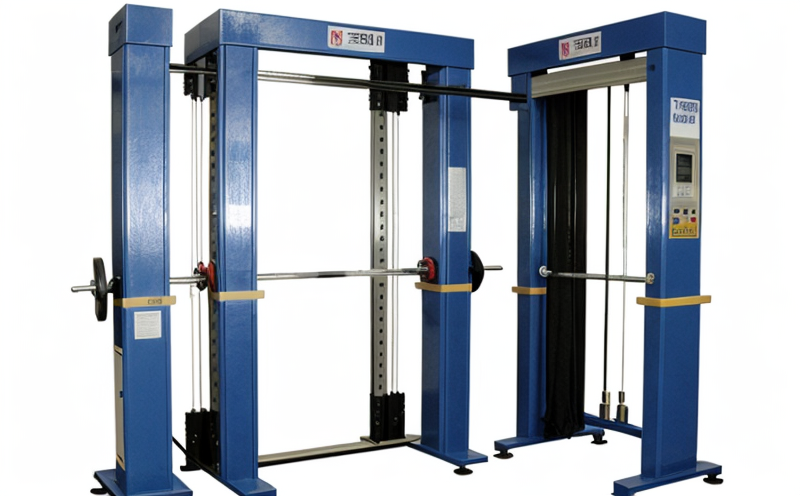GB T 3917.2 Tear strength of fabrics Elmendorf method
The GB/T 3917.2 standard provides a comprehensive methodology for determining the tear strength of fabrics using the Elmendorf method. This test is crucial in assessing how a fabric will withstand tearing forces, which is particularly important in sectors like automotive, aerospace, and construction where materials are subjected to dynamic loads.
The procedure involves cutting a specimen from the fabric according to specified dimensions and then placing it on an Elmendorf tear testing machine. The machine applies force perpendicular to the grain of the fabric until failure occurs. The peak load at which the specimen fails is recorded as the tear strength, measured in Newtons (N).
This test is essential for ensuring that fabrics meet the required performance standards. For instance, in the automotive industry, seat upholstery and trim must withstand significant stress without tearing. Similarly, in construction, fabrics used in protective clothing or building envelopes need to be robust against environmental stresses.
The Elmendorf method is preferred over other tear tests because it simulates real-world conditions more accurately. The perpendicular force application closely mimics the forces that a fabric might encounter during use. This makes GB/T 3917.2 an indispensable tool for quality managers and R&D engineers who are responsible for ensuring product durability.
The standard specifies detailed procedures to ensure accurate measurements, including specimen preparation, machine calibration, and testing conditions. Proper adherence to these guidelines is critical in obtaining reliable results that can be used for compliance checks or improvement initiatives.
When interpreting the results, it's important to consider factors such as fabric type, weave pattern, and environmental conditions. For example, a tightly woven fabric may have higher tear strength than a loosely woven one under similar conditions. Understanding these nuances helps in making informed decisions about material selection and process improvements.
The Elmendorf method is widely used across various industries, but its application can vary slightly depending on the specific requirements of each sector. For instance, in aerospace, where lightness and strength are paramount, selecting fabrics with high tear strength is crucial for ensuring safety and reliability. In contrast, in construction, durability against harsh weather conditions might be a more critical factor.
In summary, the GB/T 3917.2 test provides valuable insights into fabric performance that can significantly impact product design and quality. By employing this standardized method, manufacturers can ensure they meet or exceed industry standards, thereby enhancing their reputation and market competitiveness.
Why It Matters
The GB/T 3917.2 test is significant because it directly influences the durability of products made from fabrics. Tearing can occur due to various factors such as wear and tear, environmental stress, or accidental damage during use. By determining the tear strength using this standardized method, manufacturers can identify weak points in their materials early on, allowing for timely improvements.
For quality managers, understanding and implementing this test ensures compliance with international standards, which is crucial for market access and customer satisfaction. Compliance officers rely on these tests to verify that products meet regulatory requirements, preventing costly recalls or legal issues.
R&D engineers benefit from the insights gained through tear strength testing as it helps in optimizing material selection and design. This knowledge can lead to innovations that enhance product performance and longevity. In procurement, this test provides a reliable basis for selecting suppliers who deliver high-quality materials consistent with specified standards.
The Elmendorf method also aids in benchmarking the quality of fabrics against competitors. By consistently applying this standardized procedure, companies can ensure they are delivering superior products that meet or exceed market expectations.
In conclusion, the GB/T 3917.2 tear strength test is not just a technical requirement but a strategic tool that supports various aspects of product development and quality assurance. Its importance cannot be overstated in ensuring robust and reliable fabric performance across diverse industries.
Benefits
The implementation of the GB/T 3917.2 tear strength test offers numerous benefits to businesses involved in fabric production and utilization:
- Enhanced Product Quality: By identifying weak points early, companies can improve their products' durability and reliability.
- Compliance Assurance: Ensuring compliance with international standards reduces the risk of non-compliance issues and penalties.
- Improved Customer Satisfaction: Superior product performance translates to higher customer satisfaction and loyalty.
- Cost Efficiency: Early detection of material weaknesses can save on production costs by avoiding costly recalls or replacements.
- Innovation Opportunities: Insights from tear strength testing can inspire new designs and materials that meet evolving market demands.
- Market Competitiveness: Consistent product quality and compliance with standards enhance a company's reputation, making it more competitive in the global marketplace.
- Risk Mitigation: By understanding how fabrics perform under stress, businesses can mitigate risks associated with potential failures during use.
Eurolab Advantages
Eurolab offers a range of advantages for those seeking to conduct GB/T 3917.2 tear strength tests:
- Expertise and Experience: Our team comprises highly skilled professionals with extensive experience in fabric testing.
- State-of-the-Art Equipment: We utilize advanced Elmendorf tear testers that meet international standards for accuracy and reliability.
- Comprehensive Reporting: Our detailed reports provide clear insights into test results, facilitating informed decision-making.
- Customized Solutions: We tailor our services to meet the specific needs of each client, ensuring that tests are conducted according to their unique requirements.
- Compliance Support: Our professionals can guide clients through the process of ensuring compliance with international standards.
- Rapid Turnaround Time: We offer efficient turnaround times for test results, minimizing delays in product development and release.
- Training Services: For those looking to conduct their own tests, we provide training sessions to ensure accurate and consistent testing practices.





